

Social withdrawal: An initially adaptive behavior that becomes maladaptive when expressed excessively. Abazyan et al., 2010.
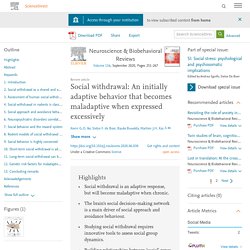
Researching the Effects of Social Isolation. Covid-19 Measures, Loneliness and Depression. Life in isolation isn’t that much fun.
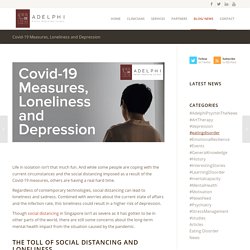
And while some people are coping with the current circumstances and the social distancing imposed as a result of the Covid-19 measures, others are having a real hard time. Regardless of contemporary technologies, social distancing can lead to loneliness and sadness. Combined with worries about the current state of affairs and the infection rate, this loneliness could result in a higher risk of depression. Though social distancing in Singapore isn’t as severe as it has gotten to be in other parts of the world, there are still some concerns about the long-term mental health impact from the situation caused by the pandemic.
The Toll of Social Distancing and Loneliness Regardless of the circumstances, there will always be people experiencing feelings of loneliness. Coronavirus is affecting the world at a time when more people than ever before are living on their own. Chronic isolation and serotonin: how social distancing can affect the brain. Isolation and mental health: Signs, impact, and how to cope. Although physical distancing is an effective way to slow the spread of many viruses, it can also lead to feelings of loneliness and isolation, especially in older adults.
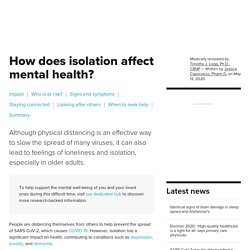
To help support the mental well-being of you and your loved ones during this difficult time, visit our dedicated hub to discover more research-backed information. People are distancing themselves from others to help prevent the spread of SARS-CoV-2, which causes COVID-19. However, isolation has a significant impact on health, contributing to conditions such as depression, anxiety, and dementia.
For this reason, the World Health Organization (WHO) encourage people to continue socializing at a distance, such as by phone or via online platforms. This article discusses how isolation and mental health affect each other. According to the WHO, social support networks can have a significant positive effect on health. The risks of social isolation.
Overview CE credits: 1 Learning objectives: After reading this article, CE candidates will be able to: Identify the effects of social isolation and loneliness on physical, mental and cognitive health.Explore how loneliness differs from social isolation.Discuss evidence-based interventions for combating loneliness.
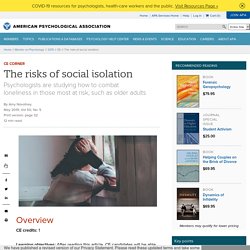
For more information on earning CE credit for this article, go to www.apa.org/ed/ce/resources/ce-corner.aspx. According to a 2018 national survey by Cigna, loneliness levels have reached an all-time high, with nearly half of 20,000 U.S. adults reporting they sometimes or always feel alone. Such numbers are alarming because of the health and mental health risks associated with loneliness. "There is robust evidence that social isolation and loneliness significantly increase risk for premature mortality, and the magnitude of the risk exceeds that of many leading health indicators," HoltLunstad says. Who is most likely? Loneliness and Social Isolation Linked to Serious Health Conditions. Social isolation, loneliness in older people pose health risks.
Human beings are social creatures.
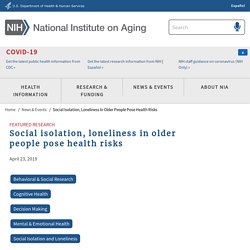
Our connection to others enables us to survive and thrive. The Costs of Social Isolation: Loneliness and COVID-19 - Psychiatry Advisor. The dizzying spread of coronavirus disease 2019 (COVID-19), as well as the ensuing social distancing restrictions and public health interventions, have contributed to an epidemic of another sort: loneliness.
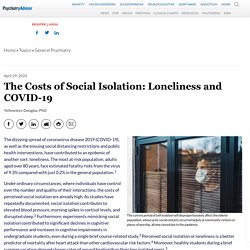
The most at-risk population, adults aged over 80 years, face estimated fatality risks from the virus of 9.3% compared with just 0.2% in the general population.1 Under ordinary circumstances, where individuals have control over the number and quality of their interactions, the costs of perceived social isolation are already high. Perceived Social Isolation and Cognition. How Social Isolation Affects the Brain. Daisy Fancourt was at her home in Surrey in southeast England when the UK government formally announced a nationwide lockdown.
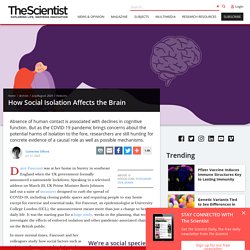
Speaking in a televised address on March 23, UK Prime Minister Boris Johnson laid out a suite of measures designed to curb the spread of COVID-19, including closing public spaces and requiring people to stay home except for exercise and essential tasks. For Fancourt, an epidemiologist at University College London (UCL), the announcement meant more than just a change to her daily life.
It was the starting gun for a huge study, weeks in the planning, that would investigate the effects of enforced isolation and other pandemic-associated changes on the British public. We’re a social species. We really need others to survive. Social isolation results in memory loss in later life. Social isolation contributes to memory loss in older age, research by LSE's Care and Evaluation Centre has shown for the first time.
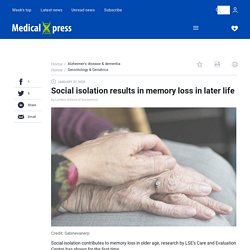
The paper, published in Journals of Gerontology, found that both men and women were affected, but in different ways. Men with high levels of social isolation experienced subsequent memory decline. For women it was not the overall level of lack of social contact, but rather increases in isolation that were important. Researchers studied data from 6123 women and 5110 men over the age of 50, from the English Longitudinal Study of Ageing (ELSA), over six two year intervals from 2002. By using a statistical model to analyze the changes in levels of social isolation and memory loss over time, they were able to establish that isolation precedes memory loss—rather than the other way around. Dr. For women it was more relative—when isolation increased by two points, women's memory declined, on average by 18 percent over the next two years. Dr. Social isolation impacts late-life socio-cognitive decline in APP/PS1 mice.
Social Isolation and Cognitive Function in Later Life: A Systematic Review and Meta-Analysis.